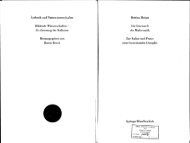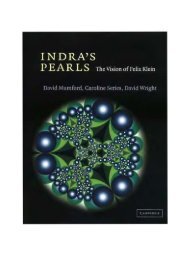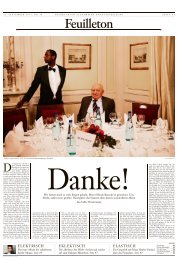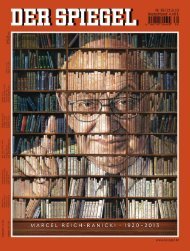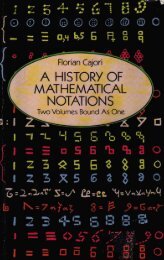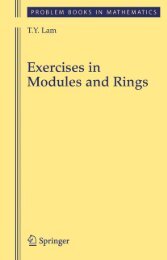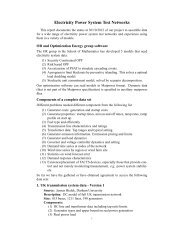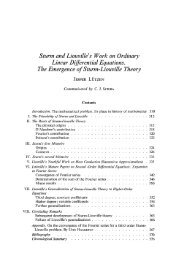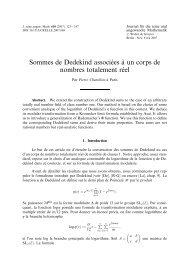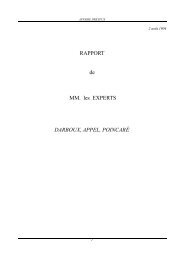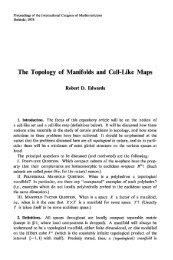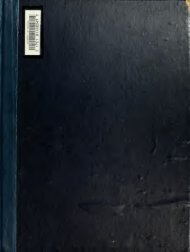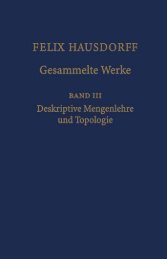Lunch with the FT: Frank Auerbach - FT.com
Lunch with the FT: Frank Auerbach - FT.com
Lunch with the FT: Frank Auerbach - FT.com
You also want an ePaper? Increase the reach of your titles
YUMPU automatically turns print PDFs into web optimized ePapers that Google loves.
<strong>Lunch</strong> <strong>with</strong> <strong>the</strong> <strong>FT</strong>: <strong>Frank</strong> <strong>Auerbach</strong> - <strong>FT</strong>.<strong>com</strong> http://www.ft.<strong>com</strong>/cms/s/2/13de02c8-0be0-11e2-8032-00144feabdc0.html<br />
LUNCH WITH THE <strong>FT</strong> Last updated: October 6, 2012 12:05 am<br />
By Jackie Wullschlager<br />
©James Ferguson<br />
“This will be <strong>the</strong> most un<strong>com</strong>fortable lunch you’ve ever<br />
done,” <strong>Frank</strong> <strong>Auerbach</strong> apologises as he opens <strong>the</strong> door<br />
to a ground-floor flat in a Victorian terrace in Finsbury<br />
Park, north London. Dressed in <strong>Auerbach</strong> colours –<br />
dark green cardigan, buttoned up, and earth-brown<br />
corduroy trousers – he is immediately engaging:<br />
bright, inquiring eyes; self-deprecating, toothy smile;<br />
oval face; wisps of grey hair; long hands.<br />
With a slight stoop, using a stick, <strong>the</strong> 81-year-old<br />
shuffles down a dark corridor, past a front room bare<br />
but for a single bed and some easels, into a narrow,<br />
unmodernised kitchen. “Would you like wine, tea or<br />
coffee?” he asks in a German accent thicker than I had<br />
imagined – he arrived in England aged eight, a refugee<br />
from Nazi Berlin, in 1939. I request water and he<br />
searches for a glass, finds a dirty one, washes it up,<br />
pours me some tap water, and makes himself tea in a<br />
willow-patterned cup.<br />
Recovering from a hip operation, he has been unable to work for<br />
three weeks – <strong>the</strong> longest break in 60 years for an artist who<br />
never takes holidays and rarely leaves London. As a result, this reclusive painter has agreed to<br />
lunch but only if I bring <strong>the</strong> food – he has suggested Marks and Spencer sandwiches – to <strong>the</strong><br />
flat belonging to his wife Julia, where he is marooned until he is mobile enough to get into a car<br />
and be driven to his Camden Town studio.<br />
“I’m grateful for visitors,” he says. “I’ve been leading this focused, obsessive life and all <strong>the</strong><br />
painter friends I valued – except Leon Kossoff – have died and I lost touch <strong>with</strong> <strong>the</strong> o<strong>the</strong>rs. I<br />
haven’t even spoken to Leon for a long time but our wives are in contact, like footballers’ wives<br />
<strong>the</strong>y share <strong>the</strong>ir troubles. I work seven days and five evenings a week, and on <strong>the</strong> o<strong>the</strong>r two<br />
evenings it’s a relief to watch Poirot and Sherlock. I’ve been pretending to draw here but it’s not<br />
<strong>the</strong> same thing. I’ve been drawing what I see out of <strong>the</strong> window but I haven’t got any feelings for<br />
1 of 5 08/11/2012 06:21
<strong>Lunch</strong> <strong>with</strong> <strong>the</strong> <strong>FT</strong>: <strong>Frank</strong> <strong>Auerbach</strong> - <strong>FT</strong>.<strong>com</strong> http://www.ft.<strong>com</strong>/cms/s/2/13de02c8-0be0-11e2-8032-00144feabdc0.html<br />
<strong>the</strong> things out of <strong>the</strong> window. I’ll throw it all away.”<br />
The view – a patchwork of small gardens, red-brick houses, tower blocks – is a typical London<br />
vista but it is not <strong>the</strong> urban grid of intensely known buildings, chimneys, lampposts, park and<br />
trees around Mornington Crescent and Primrose Hill that has constituted <strong>Auerbach</strong>’s motif for<br />
half a century. This is his equivalent of Cézanne’s Mont Sainte-Victoire: in architectonic but<br />
abstracted cityscapes, paint built up in layers <strong>the</strong>n scraped away repeatedly, he reconfigures <strong>the</strong><br />
familiar into something fresh and surprising. These works, plus densely wrought portraits of a<br />
handful of intimates, have placed <strong>Auerbach</strong> among <strong>the</strong> world’s most eminent, expensive,<br />
instantly recognisable artists. A painter steeped in tradition – “I’ve been influenced by<br />
everyone, <strong>the</strong> past is <strong>the</strong> <strong>com</strong>post in which we grow” – he has reinvented figuration <strong>with</strong> a<br />
conviction and independence standing alongside that of his contemporaries Lucian Freud and<br />
David Hockney.<br />
“When I was young I was greatly moved by Rembrandt,” he says. “I felt I stood more chance<br />
<strong>with</strong> persistence, digging deep, <strong>the</strong>n something reasonable happening, simply by laying siege to<br />
<strong>the</strong> subject. It’s just what I was capable of. Some people are natural draughtsmen. I sometimes<br />
feel sorry for <strong>the</strong>m – you have to work through that to something deeper. I don’t know how you<br />
would break up an easy virtuosity.”<br />
I produce <strong>the</strong> sandwiches: his favourites, prawn mayonnaise, chicken and bacon, plus salmon<br />
and cucumber. “Let’s get plates to make <strong>the</strong> whole thing more civilised,” he says, leading me to<br />
a back room where a small black table is set – a bottle of Médoc, a roll of kitchen towel – <strong>with</strong> a<br />
pine chair on ei<strong>the</strong>r side. The floor is covered <strong>with</strong> cardboard boxes; a bookcase overflows <strong>with</strong><br />
art volumes. “These sandwiches are a terrific luxury,” <strong>Auerbach</strong> enthuses, starting on <strong>the</strong><br />
prawns. I ask if he intended a life of monastic dedication.<br />
“It’s funny, this business of a vocation. One starts from a motive one hardly <strong>com</strong>prehends. In<br />
<strong>the</strong> school holidays I was an office boy – I found <strong>the</strong> idea of going into an office horrifying. As a<br />
painter, I thought <strong>the</strong>re would be bohemianism, freedom, and <strong>the</strong>re was, but gradually <strong>the</strong><br />
practice of art took over. As Auden says, in any crisis, <strong>the</strong> break-up of a relationship, <strong>the</strong><br />
response is to flee to <strong>the</strong> arms of <strong>the</strong> muse. At art school you know at least as many talented<br />
students as those who became painters, but <strong>the</strong>y get off <strong>the</strong> train at some point. I met Stephen<br />
Spender once, I expected a poet <strong>with</strong> a vocation but I found a civilised man, gregarious, leading<br />
a varied, entertaining, virtuous life – for whom poetry was only one of <strong>the</strong> facets. He said one of<br />
his dreams was to be a poet, <strong>the</strong> o<strong>the</strong>r to have a lovely life, go to France, know lots of people.”<br />
I reply that TS Eliot, a greater poet, felt his art had cost his life too dearly. Does <strong>Auerbach</strong> feel<br />
that? “Absolutely <strong>the</strong> contrary. If I hadn’t been able to devote myself to painting, I’d have felt I<br />
had wasted my life. I’ve been extraordinarily lucky. When I was at art school it was assumed<br />
you wouldn’t make a living – not 50 people in <strong>the</strong> country made a living <strong>with</strong> <strong>the</strong> brush <strong>the</strong>n.<br />
Now <strong>the</strong>re must be more than 5,000 people making a living by art.”<br />
<strong>Auerbach</strong> had “no money at all until my fifties. Through early middle age I would wake up in<br />
<strong>the</strong> night wondering how I would be able to afford materials to paint.” He has had <strong>the</strong> same<br />
Camden studio since he inherited it from Kossoff – his closest friend at art college, an early<br />
2 of 5 08/11/2012 06:21
<strong>Lunch</strong> <strong>with</strong> <strong>the</strong> <strong>FT</strong>: <strong>Frank</strong> <strong>Auerbach</strong> - <strong>FT</strong>.<strong>com</strong> http://www.ft.<strong>com</strong>/cms/s/2/13de02c8-0be0-11e2-8032-00144feabdc0.html<br />
model and still <strong>the</strong> painter <strong>with</strong> whom his work shares <strong>the</strong> greatest affinity – in <strong>the</strong> 1950s;<br />
typically, he sleeps <strong>the</strong>re four nights a week, and three in Finsbury Park, where Julia sits for<br />
him on Wednesdays and Thursdays. He paints her in acrylic “because it says in <strong>the</strong> lease you’re<br />
not allowed to use oil. I must be a quite obedient temperament.”<br />
The couple married and had <strong>the</strong>ir only child, Jake, in 1958, <strong>the</strong>n drifted apart. <strong>Auerbach</strong><br />
continued a relationship <strong>with</strong> Estella West (<strong>the</strong> “EOW” of many early portraits), which had<br />
begun when he was 17, she 32. “Stella,” now 96, “is still marvellous, full of courage, affection,<br />
but she can’t remember anything. I really became a painter by painting her – she sat three times<br />
a week when I wasn’t painting anyone else.”<br />
Now he has a “rigid timetable” of evening models: art critic William Feaver on Mondays; Jake<br />
on Tuesdays; curator Ca<strong>the</strong>rine Lampert on Fridays. “People create <strong>the</strong>ir own atmosphere.<br />
Julia goes to sleep, which I value. Bill has very interesting things to say. Ca<strong>the</strong>rine is between<br />
<strong>the</strong> two. One is aware of <strong>the</strong>ir personalities, electricity and tempo. I can hardly stand in a studio<br />
<strong>with</strong> just my idea and a brush. I like <strong>the</strong> conflict between reality and its awkward edges, driving<br />
you to get something sheer and <strong>com</strong>plete – something trapped ra<strong>the</strong>r than arranged.”<br />
<strong>Auerbach</strong> moves on to <strong>the</strong> chicken, <strong>the</strong>n a salmon sandwich, as <strong>the</strong> phone rings. “It’s my very<br />
nice son, who has been so helpful in this crisis [<strong>the</strong> hip operation], more than I deserve. I was<br />
fairly maladroit at arranging my life.”<br />
<strong>Auerbach</strong>, who was reunited <strong>with</strong> Julia in 1976, says: “I’m impatient <strong>with</strong> <strong>the</strong> paraphernalia of<br />
domestic life. It doesn’t mix. We’re driving each o<strong>the</strong>r mad here,” he adds amiably. Julia spends<br />
one week in four at her Norfolk house, and she paints <strong>the</strong>re. “I’ve never seen <strong>the</strong> place – well, I<br />
never leave London.” But he has seen <strong>the</strong> work? “I haven’t seen <strong>the</strong> work but I’m sure it’s of<br />
some quality.” Would he be interested in seeing it? “I don’t think I am. I have be<strong>com</strong>e less<br />
curious about o<strong>the</strong>r people’s work as I get older.”<br />
This is delivered deadpan yet when I produce grapes and macaroons – also from Marks and<br />
Spencer – for dessert, his eyes light up. “Ooh, Julia will be delighted <strong>with</strong> <strong>the</strong>m! I wish you<br />
could be here to see her face when she <strong>com</strong>es in and sees <strong>the</strong>m. It’s extremely kind of you.” He<br />
goes on sipping tea, <strong>the</strong> macaroons stay in <strong>the</strong>ir box, <strong>the</strong> wine remains unopened, as <strong>Auerbach</strong><br />
explains that “I never had to unlearn bourgeois things because I had never learnt <strong>the</strong>m. I<br />
haven’t been good <strong>with</strong> money. I have no luxuries except taxis.”<br />
The son of an affluent Jewish lawyer, he arrived alone in England after travelling on <strong>the</strong><br />
Kindertransport trains on which Jewish parents sent <strong>the</strong>ir children to <strong>the</strong> safety of foster<br />
families or boarding schools. Many of <strong>the</strong> parents who stayed in Germany, including<br />
<strong>Auerbach</strong>’s, were subsequently killed in concentration camps.<br />
<strong>Auerbach</strong> attended Bunce Court in Kent, a boarding school where most pupils and teachers<br />
were refugees. “I was taught by curious misfits. No one ever suggested you had to make a living.<br />
There was a certain intellectual snobbery, partly imported from Germany. On my first day I saw<br />
kids running around <strong>with</strong>out haircuts, <strong>the</strong>y locked me in <strong>the</strong> shed. One child picked a fight <strong>with</strong><br />
me because I looked so coddled. I’d never had a fight in my life. I said to ano<strong>the</strong>r boy, ‘I think I<br />
3 of 5 08/11/2012 06:21
<strong>Lunch</strong> <strong>with</strong> <strong>the</strong> <strong>FT</strong>: <strong>Frank</strong> <strong>Auerbach</strong> - <strong>FT</strong>.<strong>com</strong> http://www.ft.<strong>com</strong>/cms/s/2/13de02c8-0be0-11e2-8032-00144feabdc0.html<br />
might get on a bit better if you cheered for me.’ ” The boy was Michael Roemer, who went on to<br />
be<strong>com</strong>e a film director/writer, a life-long friend of <strong>Auerbach</strong>’s and “<strong>the</strong> first person who bought<br />
a drawing of mine. He had no money ei<strong>the</strong>r. For 12 years he paid in instalments of $5.”<br />
<strong>Auerbach</strong> never saw his parents again; letters stopped in 1943 but, by <strong>the</strong>n, “Bunce Court was<br />
actually my home.” He has said he coped by “total denial”, that “I was spared <strong>the</strong> struggle<br />
against parental will, <strong>the</strong>re was no one to tell me what a lot of nonsense to want to be an artist”.<br />
None<strong>the</strong>less, “I was always aware of death because of my background. And in some curious way<br />
<strong>the</strong> practice of art and <strong>the</strong> awareness of <strong>the</strong> imminence of death are connected. O<strong>the</strong>rwise we<br />
would not find it necessary to do <strong>the</strong> work art finally does – to pin down something and take it<br />
out of time. If you take a photograph, it be<strong>com</strong>es historic five seconds later. But if you do a<br />
painting: Frans Hals’ portrait of woman – he’s yanked her out of <strong>the</strong> 17th century and brought<br />
her here and in a small way he has defeated death.”<br />
How does it work? “I’ve never been moved by a real landscape as I have by paintings of<br />
landscape. It’s because every moment is transmitted by human will that we identify ourselves<br />
<strong>with</strong> it. In a painting you re-experience what <strong>the</strong> painter experienced, one brushstroke over<br />
ano<strong>the</strong>r, it’s like a perpetuum mobile. A photograph is just pixels.”<br />
He believes that “only recently has my work added up to what could be a small oeuvre. In <strong>the</strong><br />
last five years some people have be<strong>com</strong>e aware of my work and even have feelings about it.”<br />
This is, of course, an underestimate. <strong>Auerbach</strong> has long been celebrated; his prices did,<br />
however, begin to achieve new records – £1.92m for “Camden Theatre in <strong>the</strong> Rain” in 2007,<br />
£1.94m for “Head of Helen Gillespie” in 2008 – in <strong>the</strong> past five years.<br />
His working pattern has been unchanged for decades. He rises <strong>with</strong> <strong>the</strong> dawn, goes out to draw,<br />
returns to <strong>the</strong> studio “where I will have a painting on <strong>the</strong> go. Instead of staring at this painting<br />
and making aes<strong>the</strong>tic decisions, I look at <strong>the</strong> drawing, which is like a note. Then I repaint,<br />
scrape, repaint <strong>the</strong> painting, it never takes less than months, sometimes years. Then <strong>the</strong>re’s a<br />
point, a coup de foudre, like an explosion, when something ra<strong>the</strong>r radical happens, something I<br />
hadn’t foreseen, and it is finished. But <strong>the</strong>re can be false finishes. And not everything will work.<br />
I go to considerable lengths to destroy what I don’t like. If I hadn’t edited as much as I have, I<br />
would be deeply depressed. Matisse said, ‘My only enemies are my bad pictures.’ ”<br />
He has agreed to a show this autumn featuring a new landscape, drawings and, unusually,<br />
self-portraits. “When I was young, my head seemed bland: I never had <strong>the</strong> narcissism of<br />
Courbet or Dürer, who obviously thought <strong>the</strong>mselves marvellous-looking chaps. As I got more<br />
wrinkly, <strong>with</strong> bags under <strong>the</strong> eyes, <strong>the</strong> whole landscape became more interesting. But I also<br />
partly started doing <strong>the</strong>m [self-portraits] because people were talking more when I painted<br />
<strong>the</strong>m, and <strong>the</strong>re’s something refreshing about going back to silence.”<br />
I take this as a cue to leave, and beg him not to bo<strong>the</strong>r to see me out. But he grabs his stick and<br />
leaps up. “No, no, I’d like to. The more I behave like a human being, <strong>the</strong> better.”<br />
.......................................................................<br />
4 of 5 08/11/2012 06:21
<strong>Lunch</strong> <strong>with</strong> <strong>the</strong> <strong>FT</strong>: <strong>Frank</strong> <strong>Auerbach</strong> - <strong>FT</strong>.<strong>com</strong> http://www.ft.<strong>com</strong>/cms/s/2/13de02c8-0be0-11e2-8032-00144feabdc0.html<br />
Jackie Wullschlager is <strong>the</strong> <strong>FT</strong>’s chief visual arts critic<br />
‘<strong>Frank</strong> <strong>Auerbach</strong>: Next Door’, Marlborough Gallery, London, Oct 12-Nov 10;<br />
‘<strong>Frank</strong> <strong>Auerbach</strong>: Early Works’, Offer Waterman Gallery, London, Nov 2-Dec 1<br />
.......................................................................<br />
<strong>Frank</strong> <strong>Auerbach</strong>’s flat<br />
Finsbury Park, north London<br />
Prawn mayonnaise sandwich £1.85<br />
Chicken and bacon sandwich £2.75<br />
Salmon and cucumber sandwich £1.90<br />
Red grapes £2.50<br />
Mini macaroons £5.49<br />
(All from Marks and Spencer)<br />
Tea<br />
Tap water<br />
Total £14.49<br />
Printed from: http://www.ft.<strong>com</strong>/cms/s/2/13de02c8-0be0-11e2-8032-00144feabdc0.html<br />
Print a single copy of this article for personal use. Contact us if you wish to print more to distribute to o<strong>the</strong>rs.<br />
© THE FINANCIAL TIMES LTD 2012 <strong>FT</strong> and ‘Financial Times’ are trademarks of The Financial Times Ltd.<br />
5 of 5 08/11/2012 06:21



